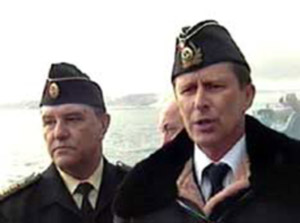ST. PETERSBURG—The Presidium of Moscow City Court has acceded that a drawn-out dispute between Bellona, the Ministry of Defence and the commander of the Russian Navy over the release of information about several nuclear submarine accidents contains no classified information and must be heard in Moscows Presnya District Court.
The decision late last week by the Moscow City Court puts to rest a months-long hot-potato game between that court, which has jurisdiction over cases alleged to contain state secrets, and the Presnaya District Court, which deals with cases involving the Defence Ministry. The two courts, until now, have managed to create a legal deadlock, with one court claiming the case contains no classified information and the other insisting that it does.
Both courts have thus fought tooth and nail to cast the case into the others jurisdiction ever since Environmental Rights Center, or ERC, Bellona, Bellonas, St. Petersburg branch, filed a complaint that information about accidents occurring aboard Soviet submarines between 1961 and 1985 were not state secrets and should be made available to the public.
The road is open to decide the real question in the district court. We insist that, by law, all information about accidents on Soviet nuclear submarines must be open, said ERC director and lawyer, Ivan Pavlov in an interview with Bellona Web.
Thursdays decision sets a precedent—such cases have never been heard in Russian courts, added Pavlov, who is also the director of the Institute for Information Freedom Development, a research and advocacy NGO focused on the legal aspects of human rights and access to government information.
The seeds of the dispute
Specifically, Bellonas complaint addressed a written refusal by the Russian Navys Commander in Chief, Admiral Vladimir Kuroyedov, to release information about the submarines ERC had specified in a letter to Defence Minister Sergei Ivanov. The letter had been sent to Ivanov two years ago, and ERC did not receive an official reply—from Kuroyedov rather than Ivanov—until November, 2002. Kuroyedov refused the request to declassify the information.
The two year old letter sought simply to obtain specific information about the health threats caused by accidents aboard the subs.
It is known that as a result of these accidents, people suffered and radioactive emissions in the environment were registered, read in part ERCs letter to the Defence Ministry. Despite this, the full results of these emergencies remain to this time concealed from the public.
Legal ping-pong
Having received Kuroyedovs response, ERC Bellona in February 2003 filed a complaint with the Presnya District court of Moscow—which has jurisdiction over cases concerning the Ministry of Defence—regarding the Navy commanders refusal to de-classify socially significant information. But the Presnya District court refused to review the complaint, answering that this case, which allegedly concerns state secrets, must be considered by the court of the subject of the Russian Federation—in this case by the Moscow City Court. ERC contested the District Courts decision, but the Moscow City Court upheld it—for a time.
ERC was thus forced to lodge a similar complaint against the Navy commander to the Moscow City Court. But in its turn, the Moscow City Court issued a statement on August 28th 2003 that the ERC Bellonas declaration, by law, does not fall under the jurisdiction of a court of a city of federal significance.
The decision, signed by the judge Svetlana Kurtsinsh, further read that the complaint should be handed over to the Presnya District Court, because the case does not concern state secrets. The Russias Supreme Court, having checked this decision, kept Kurtsinshs decision in force.
As a result of this legal ping-pong, two opposite court decisions had joined into one force. According to the decision of the Presnya District Court, the case comprised state secrets and had to be considered in the Moscow City Court. For its part, the Moscow City Courts pointed out that the case should be lodged with the district court, because it actually doesnt concern any state secrets.
Confronted with the absurdity of the situation, Bellonas lawyers filed a so-called supervisory complaint to the Moscow city Court Presidium, disputing the decision of the Presnya District Court. The complaint asserts that the case should be considered by the Presnya Court, as the information inquired about by ERC cannot legally be made a state secret.
Having studied the supervisory complaint, a judge of the Moscow City Court handed it to the Presidium of the Moscow City Court which ruled that the Presnya District court must consider the case against Kuroyedov to release the information about the submarines.
The subs in question
In its initial two-year-old inquiry to the Defense Ministry, ERC Bellona requested that information about accidents and incidents on board 15 Soviet submarines be declassified. The tactical numbers of the submarines are K-19, K-387, TK-208, K-279, K-447, K-508, K-209, K-210, K-216, K-316, K-462, K-38, K-37, K-371, and K-367, which, according to open information sources had each suffered accidents and technical failures—the most notorious among them being the K-19.
These subs, which are laid up at Russian Northern Fleet bases, have been retired and await full dismantlement—some with their spent nuclear fuel still onboard. Others, like the K-19, have been defuelled and are slated for destruction. Still others have been fully destroyed—mostly with US threat reduction funding—and their spent nuclear fuel has been sent to the Mayak Chemical Combine in the Southern Urals for reprocessing.




